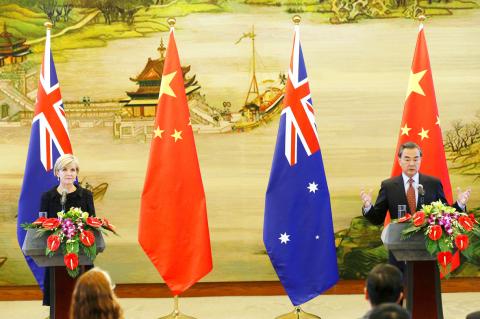China yesterday called on Australia to take into account the feelings of Asian nations as Canberra contemplates buying a fleet of submarines from Japan.
In some of his strongest remarks on the possible deal, Chinese Minister of Foreign Affairs Wang Yi (王毅) told reporters Australia should consider the context of Japan’s role in World War II in developing its military relationship with Tokyo.
Wang made the remarks to journalists during a joint briefing with visiting Australian Minister for Foreign Affairs Julie Bishop.

Photo: AP
“We hope that in military cooperation with Japan, Australia will take into full account this historical context and take into consideration also the feelings of Asian countries, because of that history,” Wang said. “We hope that Australia will take concrete actions to support the peaceful development of Japan and Japan’s efforts to uphold its pacifist constitution, and not the opposite.”
Australia this year is to pick the design for a new fleet of submarines in a deal worth as much as A$40 billion (US$28.51 billion).
Japan, which is offering a variant of its Soryu submarine, is competing against rival bids from Germany and France for the contract.
Washington is encouraging closer security cooperation between Japan and Australia.
Bishop arrived in Beijing on Tuesday after visiting Tokyo. Australia is seeking to deepen economic ties with China, its largest trading partner.
Bishop said a “comprehensive evaluation process” was underway about a submarine deal that would meet Australia’s capability and technological requirements.
“That is what will drive the competitive evaluation process that is currently underway,” she added.

The Taiwanese passport ranked 33rd in a global listing of passports by convenience this month, rising three places from last month’s ranking, but matching its position in January last year. The Henley Passport Index, an international ranking of passports by the number of designations its holder can travel to without a visa, showed that the Taiwan passport enables holders to travel to 139 countries and territories without a visa. Singapore’s passport was ranked the most powerful with visa-free access to 192 destinations out of 227, according to the index published on Tuesday by UK-based migration investment consultancy firm Henley and Partners. Japan’s and

NATIONAL SECURITY THREAT: An official said that Guan Guan’s comments had gone beyond the threshold of free speech, as she advocated for the destruction of the ROC China-born media influencer Guan Guan’s (關關) residency permit has been revoked for repeatedly posting pro-China content that threatens national security, the National Immigration Agency said yesterday. Guan Guan has said many controversial things in her videos posted to Douyin (抖音), including “the red flag will soon be painted all over Taiwan” and “Taiwan is an inseparable part of China,” while expressing hope for expedited “reunification.” The agency received multiple reports alleging that Guan Guan had advocated for armed reunification last year. After investigating, the agency last month issued a notice requiring her to appear and account for her actions. Guan Guan appeared as required,

Japan and the Philippines yesterday signed a defense pact that would allow the tax-free provision of ammunition, fuel, food and other necessities when their forces stage joint training to boost deterrence against China’s growing aggression in the region and to bolster their preparation for natural disasters. Japan has faced increasing political, trade and security tensions with China, which was angered by Japanese Prime Minister Sanae Takaichi’s remark that a Chinese attack on Taiwan would be a survival-threatening situation for Japan, triggering a military response. Japan and the Philippines have also had separate territorial conflicts with Beijing in the East and South China

A strong cold air mass is expected to arrive tonight, bringing a change in weather and a drop in temperature, the Central Weather Administration (CWA) said. The coldest time would be early on Thursday morning, with temperatures in some areas dipping as low as 8°C, it said. Daytime highs yesterday were 22°C to 24°C in northern and eastern Taiwan, and about 25°C to 28°C in the central and southern regions, it said. However, nighttime lows would dip to about 15°C to 16°C in central and northern Taiwan as well as the northeast, and 17°C to 19°C elsewhere, it said. Tropical Storm Nokaen, currently